Is your e-commerce team still copying orders into ERP manually?
Are pricing errors costing you customers?
If so, you’re not alone—and ERP integration might be your answer.
Given that 2026 internet sales are expected to represent more than 24% of worldwide retail sales, the demand for uninterrupted digital operations has never been more crucial. Many online retailers still face siloed systems, manual processes, and limited operational visibility. That’s where integrated ERP and ecommerce systems provide a competitive edge—by automating processes, reducing errors, and scaling digital operations. We will explain here what eCommerce ERP integration is, why it is important in the current retail environment, and how you can address it to spur long-term growth.
Why Integrate ERP with eCommerce?
Many online retailers’ daily operations are inefficient, including fragmented inventory tracking, slow manual order processing, and regular data entry mistakes. These problems slow down expansion and irritate clients. Frequently arising from the absence of contact among vital parts, these problems cause inconsistent pricing, shipping delays, and obsolete customer data.
eCommerce ERP integration is vital there. Linking your e-commerce system with your ERP solution enables you to access live synchronization of orders, inventory, customer data, and financial information. Your company benefits from automated processes that speed up operations and lower human mistakes by not depending on manual changes.
In fact, Luvina Software helped a Singapore-based flower retailer cut fulfillment time by 40% after switching from manual order sync to real-time ERP integration.
ERP and eCommerce integration builds the groundwork for long-term scalability and offers minute-to-minute accuracy improvements. Whether it’s updating stock levels instantly after a purchase, synchronizing pricing changes across channels, or keeping a single source of truth for customer information, integration enables departments to center on strategic growth instead of mundane chores. Consequently, one has a more responsive e-commerce environment in general, better judgment, and sleek customer service.
2 Key Models of Ecommerce Website Integration with ERP
Understanding the various models of eCommerce ERP integration will help you align data flow, reduce inefficiencies, and scale your operations strategically. Below are the 2 primary types of integration that businesses can consider:
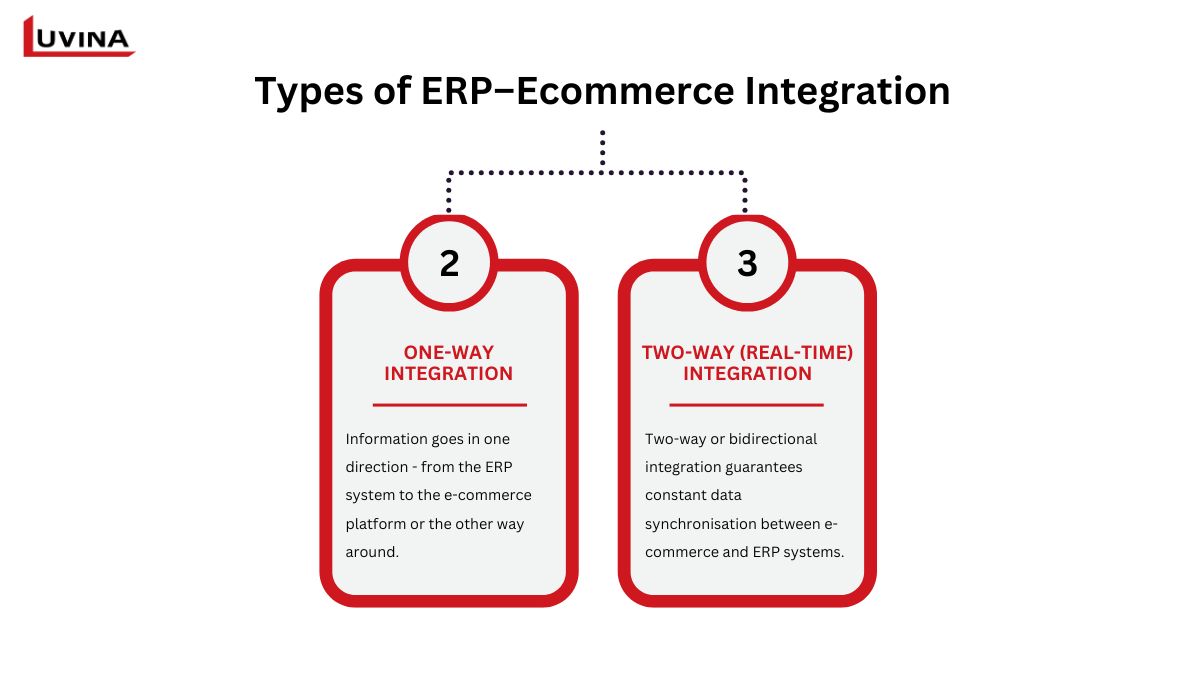
- One-way integration
The model lets information go in only one direction, namely, from the ERP system to your e-commerce platform or the other way around. It is widely used by small businesses or those with simple processes to, for example, push everyday sales information from e-commerce into ERP or import product information from the store into ERP. Though less sophisticated and straightforward to put in, this technology is best for activities that do not need constant updates, since one-way integration lacks real-time synchronization. It can lead to data inconsistency if changes occur in both systems without reverse synchronization.
- Two-way (real-time) integration
Two-way or bidirectional integration, a more sophisticated choice, guarantees constant data synchronization between e-commerce and ERP systems. Real-time sharing of orders, inventory levels, customer information, and payment updates helps to cut down on mistakes by lessening the need for manual data entry. This strategy provides a completely integrated ERP e-commerce platform, so corporations can make more intelligent decisions at all levels using current data analysis.
Top Benefits of ERP and Ecommerce Integration for Online Retail
For companies desiring to expand effectively and lower operational friction, integrating their e-commerce platform with an ERP system gives revolutionary benefits. An integrated ERP ecommerce solution ensures that both back-end and customer-facing processes align. These are the primary advantages of this integration:
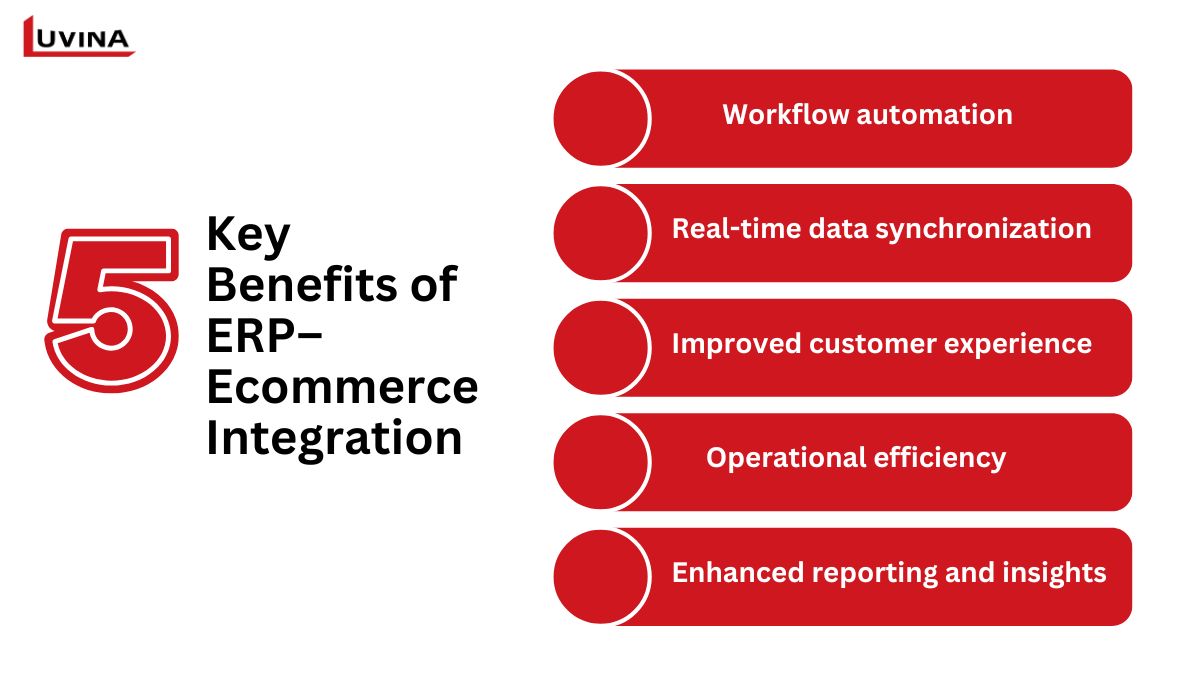
- Workflow automation: By integrating order processing, inventory updates, billing, and fulfillment into one flow, companies could automate routine operations and greatly cut manual input. Streamlining the order-delivery loop speeds up operations and improves employee productivity. Highlighting the powerful influence of automation, research indicates that ERP systems reduce general operational costs by 23% and administrative costs by 22%.
- Real-time data synchronization: Perfect synchronization guarantees that inventory levels, order status, customer profiles, and pricing always exist across all systems. This removes inconsistencies and allows for quick, confident decisions based on precise data. Automated instant live updates, for instance, help to prevent overbooking or delays from obsolete inventory information.
- Improved customer experience: Customers appreciate a clearer purchasing path when fast order processing, live stock visibility, and recent shipping information are all offered. Accurate, real-time order tracking as well as customized service will boost happiness and encourage customer loyalty.
- Operational efficiency: Automation frees up precious time and resources while decreasing the likelihood of human mistakes. Integrated systems eliminate these chances, but a single mistake or out-of-date inventory update can cause expensive delays. Reducing labor expenses and improving general output also arise from lessened manual tasks performed by firms.
- Enhanced reporting and insights: Companies get a full picture of performance in sales, goods, and consumer behavior via integrated data analysis. This amount of understanding underpins wise preparation, flexible forecasting, and well-informed corporate decisions.
3 Proven Methods for ERP and Ecommerce Integration
As every company works with its peculiar combination of software, infrastructure, and procedures, implementing eCommerce ERP integration can be difficult. Selecting an integration method that meets your present architecture and business requirements is essential to guarantee a seamless link between your ERP and eCommerce platform. Here are the most usual techniques employed to carry out this integration efficiently.
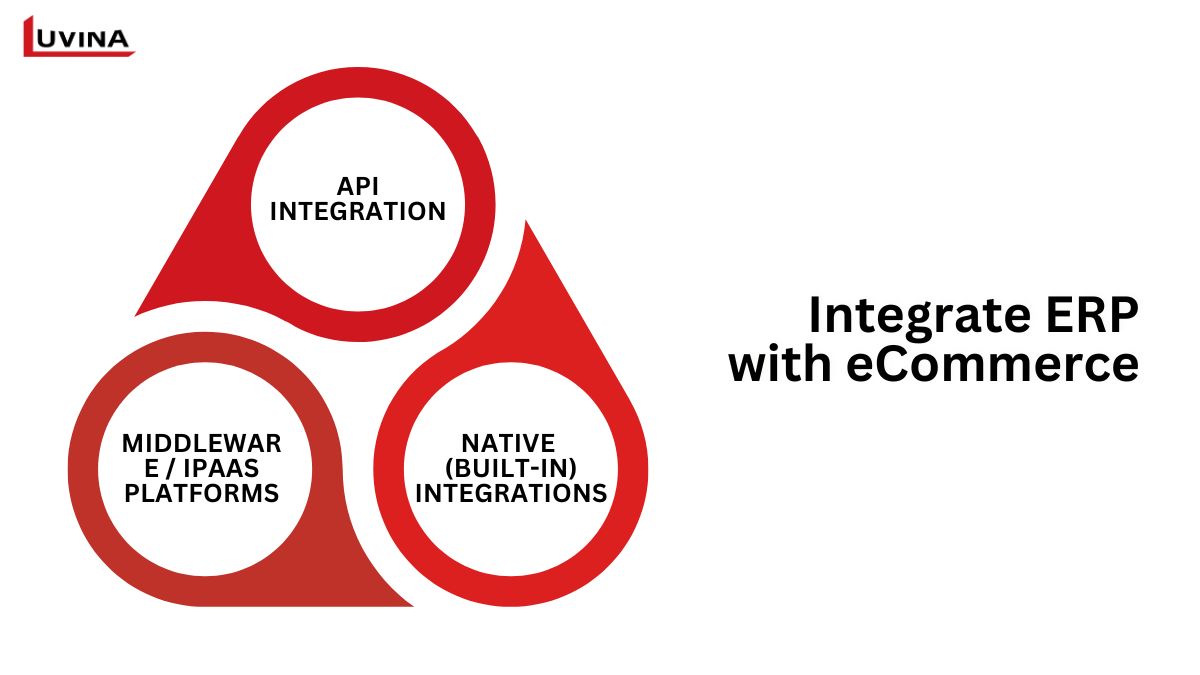
1. API Integration
API integration helps applications connect through their programming interfaces.
API integration provides one of the most flexible and scalable ways of ecommerce website integration with ERP for companies working with niche technologies or have particular needs. Using open APIs (application programming interfaces), companies can establish custom links between their e-commerce platforms and ERP systems, thereby guaranteeing smooth data flow to meet their precise operational requirements.
For businesses needing extensive customization—whether it be synchronizing custom workflows, managing unique data formats, or integrating with other third-party software not supported by native applications—this approach is perfect. API integration usually calls for major technical knowledge or cooperation with seasoned development partners.
2. Middleware/iPaaS Platforms
Solutions including middleware and Integration Platform as a Service (iPaaS), Zapier, Celigo, Dell Boomi, and MuleSoft) Give a versatile, cloud-based solution for eCommerce ERP integration. Intermediate intermediaries, these platforms connect ERP systems with e-commerce applications, hence facilitating smooth communication and data synchronization without specialized custom development.
Middleware platforms enable speedier synchronization, improved scalability, and more flexible reactions to changing company demands by operating in the cloud. Businesses looking to reduce technical complexity are still able to customize workflows and integration flows across systems, especially when they find them appropriate.
While iPaaS reduces complexity, it can sometimes introduce latency, data limits, or high costs when scaling up.
3. Native (Built-in) Integrations
Seamlessly and dependably, native integrations simplify integrating ERP with ecommerce applications. These integrations are designed to operate out of the box with chosen platforms (including Shopify, NetSuite, Odoo, or SAP) without the need for extra middleware or custom development, directly developed and maintained by ERP or e-commerce companies.
Native integrations are particularly simple, which is their most apparent benefit. Usually, they provide fast installation, little setup, and steady vendor contact, which makes them perfect for companies valuing stability and simplicity of deployment. Native solutions are less flexible, although they are certainly convenient. They are therefore most appropriate for businesses whose operational requirements closely match the preset capabilities and workflows of the built-in interface.
Popular ERPs That Support eCommerce Integration
Many well-known ERP systems provide capabilities that may be easily linked with e-commerce platforms to enable companies to streamline tasks, enhance data accuracy, and improve customer experience. With their strengths, let’s look at some of the top ERPs that support ecommerce ERP integration:
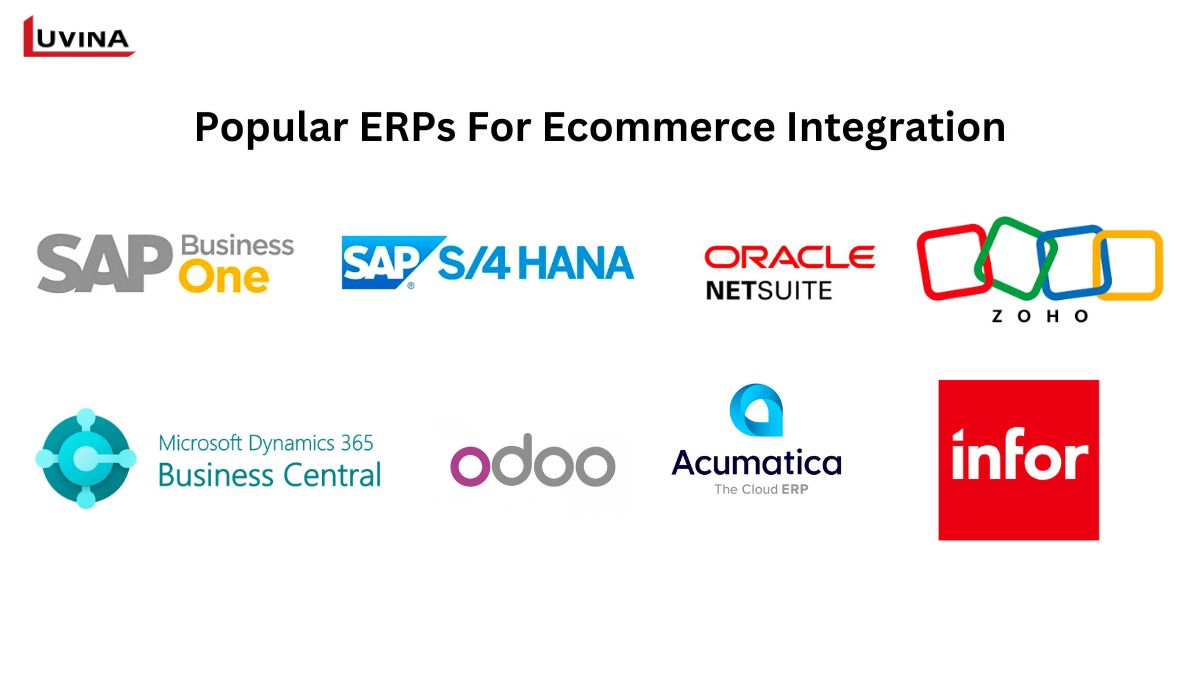
- SAP Business One
Providing a broad spectrum of features from accounting and finance to CRM and inventory management, SAP Business One is a full-featured ERP solution meant for middle-market companies. For companies trying to grow effectively, SAP Business One is perfect since it has strong integration features.
- SAP S/4HANA
A sophisticated ERP solution designed for big companies and rapidly growing ones is SAP S/4HANA. Industry-specific solutions, advanced analytics, and real-time data processing all make for a sturdy foundation for eCommerce companies needing sophisticated operations.
- Oracle NetSuite
A cloud-based ERP system, Oracle NetSuite is famous for its simplicity, flexibility, and incorporated ecommerce functionality. With prebuilt links to major ecommerce systems like Shopify, WooCommerce, and BigCommerce, it is a good option for companies wanting both versatility and performance in their ERP and ecommerce integration.
- Microsoft Dynamics 365 Business Central
For small to medium-sized firms, Microsoft Dynamics 365 Business Central provides a total ERP solution. Helping companies run their operations effectively while guaranteeing flawless data synchronization, it seamlessly interfaces with several e-commerce platforms, including Shopify, BigCommerce, and WooCommerce.
- Odoo ERP
An open-source ERP, Odoo, brings together several corporate departments, including sales, advertising, finance, and HR, on one platform. For online businesses wanting to link their website and business to a consumer store closely with backend operations, the modular nature of it lets companies scale their activities; hence, it is a great option.
- Zoho Inventory (or Zoho One)
Zoho Inventory or Zoho One offers integrated features for order management, inventory, and finance, but it is not a full-fledged ERP like SAP or NetSuite. Particularly for companies requiring real-time inventory level monitoring, it offers a cloud-based inventory management solution. Its connection with services like WooCommerce makes it perfect for companies with several warehouses and channels.
- Infor ERP
Businesses with sophisticated demands will find Infor ERP to be very adaptable and versatile. E-commerce firms searching for sophisticated capabilities in supply chain, finance, and sales make it a perfect match since its flexibility enables it to be customized to particular commercial demands.
- Acumatica ERP
Businesses needing flexible, mobile-friendly solutions will find Acumatica, a cloud-based ERP, ideal. Particularly useful for retail and distribution companies seeking to improve their eCommerce ERP integration is the strong multichannel distribution, real-time data access, and mobile capabilities support.
Leading Ecommerce Platforms That Support ERP Integration
The best e-commerce solution may significantly increase the efficiency of eCommerce ERP integration by offering smooth data synchronization and automation of critical corporate operations. Leading e-commerce platforms that have powerful functionality for integrated ERP e-commerce are as follows:
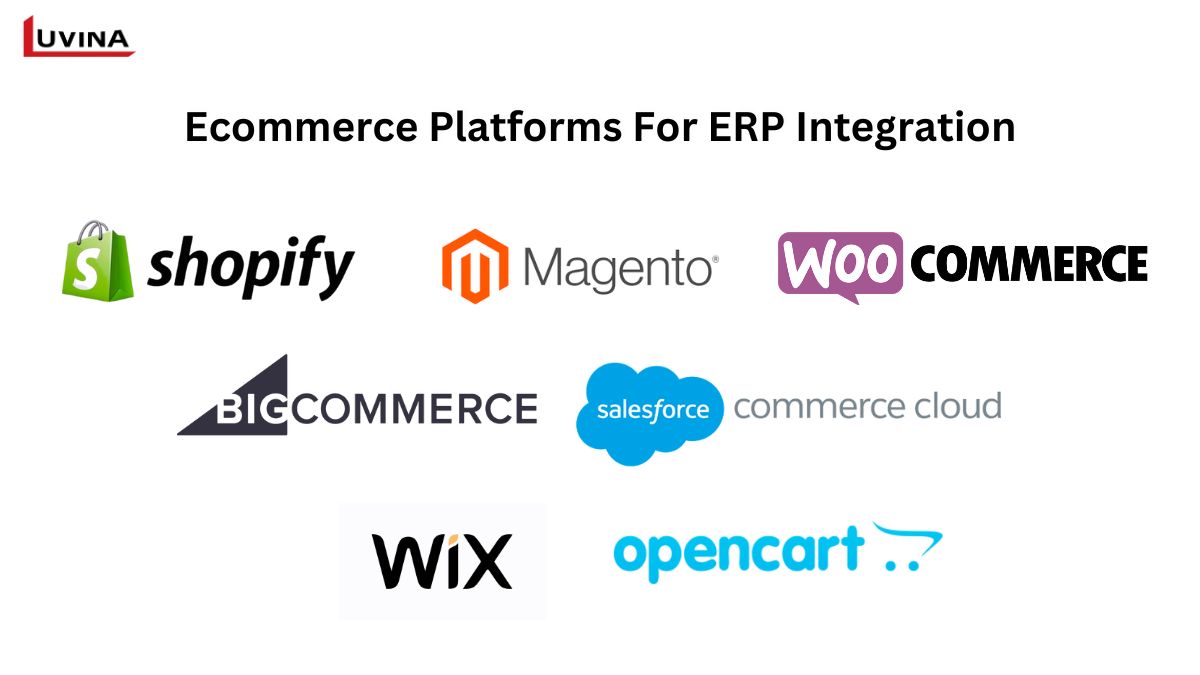
- Shopify
Businesses can automate important activities, including inventory management, order fulfillment, and accounting, using Shopify’s many prebuilt connections with top ERP systems like NetSuite, Microsoft Dynamics, and SAP. Given its many applications available via the Shopify App Store, this platform enables small and medium businesses to easily conduct third-party ERP integration without sophisticated customizations.
- Magento (Adobe Commerce)
Magento enables sophisticated integration of enterprise resource planning software, including SAP, Oracle NetSuite, and Microsoft Dynamics, with others. Magento’s open-source character lets companies create custom API-driven ERP integrations, thereby providing very personalized solutions for handling everything from inventory to supply chain. Furthermore, it enables third-party middleware to link with many ERPs for more complicated use scenarios.
- WooCommerce
A WordPress plugin, WooCommerce, runs many small and medium-sized online businesses. Although it lacks the features of other services, its integration options are robust via APIs and plugins. Via extensions or custom development, WooCommerce lets companies link ERP systems such as Odoo, SAP Business One, and Microsoft Dynamics.
- BigCommerce
For expanding firms, BigCommerce is a cloud-based solution that has sophisticated e-commerce features and native support for ERP integrations. It integrates elegantly with ERPs such as Microsoft Dynamics 365, SAP, and NetSuite. BigCommerce shines for its prebuilt linkages with well-known ERP systems that reduce the calls for personal coding. Real-time data synchronization between the ERP system and e-commerce store is another feature of the platform, which guarantees accuracy and uniformity on all channels.
- Salesforce Commerce Cloud
Apart from other top systems like SAP and Oracle, Salesforce Commerce Cloud works well with Salesforce’s own ERP system. With artificial intelligence-driven suggestions, real-time data analytics, and customer relationship management (CRM) integration, Salesforce Commerce Cloud does well at ecommerce ERP integration in big, international businesses.
- Wix
Although not as sophisticated as other platforms, Wix provides simple ERP integrations via third-party apps, including QuickBooks and Zoho. Small companies that need a straightforward ERP link to help with orders and inventory have a great option here.
- OpenCart
OpenCart gives companies flexible ERP integration features to interact with ERP systems, including Odoo, SAP, and Microsoft Dynamics. OpenCart allows third-party middleware and API integration. For businesses seeking greater control over their ecommerce and ERP integration without the licensing cost associated with enterprise-level solutions, this system is especially appealing.
What to Consider Before Integrating ERP with Your Ecommerce Platform
Before jumping into ecommerce ERP integration, these points should be considered:
- Clearly define the data flow: It is vital to know how sensitive data, such as customer information, orders, stock levels, and product specifications, will move between your e-commerce platform and your ERP system.
- Check integration capability on both systems: Not all e-commerce platforms are by nature compatible. It is vital to verify that both systems can use third-party middleware or APIs that allow smooth integration.
- Be aware of hidden costs: Integration comes with costs beyond development. These can include ongoing API maintenance costs, downtime costs when sync fails or errors occur, and the need for high technical expertise, which may require hiring skilled developers or consultants.. Factoring these early on will help manage your budget and avoid surprises.
- Run integration testing before going live: Before the systems go live, extensive testing should be conducted to identify any issues in data synchronization or workflow integration. Once the systems are properly running, this testing stage reveals any issues that might affect corporate operations. Including end users in the testing phase allows for useful feedback to be used to make changes beforehand.
- Have a solid data backup plan: Regularly back up your e-commerce and ERP systems and set guidelines on fast data recovery if anything goes wrong. This helps to reduce the chances of data loss and downtime.
- Work with experienced implementation partners: Collaborating with experienced e-commerce and ERP integration partners can greatly streamline the process. An expert in this field can help you through the setup, testing, and go-live phases since they grasp the complexity of linking different systems. Select partners who have an enthusiastic development community behind them, offer constant support and troubleshooting, and help your system to change with your company’s growth. Having a reliable partner during ERP and ecommerce integration ensures smooth and seamless operations
Need to Link Your ERP and Online Store? Luvina Can Help!
Ready to Integrate Your ERP with Ecommerce?
Here are 3 steps to get started:
1. Audit your current systems and data flow.
2. Choose the integration model based on complexity and resources.
3. Consult with an ERP integration expert to assess feasibility and cost.
Luvina Software’s ERP solution is here to help if you want to improve your daily operations with smooth eCommerce ERP integration. Our 750+ experts are set to help you connect your ERP system with your online store effectively, therefore guaranteeing seamless sync and better operational effectiveness.

Using ERP and e-commerce integration, we offer customized answers to boost your workflow, do away with manual operations, and raise data accuracy. Luvina can help in this way:
- Assessing business needs: We understand your particular needs to develop a tailored strategy for seamless integration of e-commerce and ERP. This guarantees your integration meets your particular business requirements and increases efficiency.
- Choosing the best integration approach: Luvina aids in identifying the most appropriate integration approach for your company’s complexity and size. We guarantee a smooth data synchronization among your systems, irrespective of whether they are third-party connectors, API-based, or custom-built applications.
- Ensuring real-time data updates: With Luvina’s integration solutions, your systems will get real-time updates so that better decisions can be made.
- Security measures and compliance: Data security is our first concern. Using the best industry standards, our integration services guarantee the secure handling of customer and business information.
- Providing ongoing support: Luvina gives continuous support to maximize your system once the integration has been finished.
Having significant experience in systems such as SAP, Oracle, and Dynamics, Luvina helps us to become a very important merchant in rolling out efficient eCommerce ERP integration. By making your online store work at its best, our committed staff is prepared to help your company grow by linking your ERP system with it. Reach out to Luvina now and get started on your integration trip!
Conclusion
It is more vital nowadays than ever before to have your systems integrated and optimized as e-commerce develops further. With proper planning, ERP and e-commerce integration drive digital transformation at scale.
Ready to automate your e-commerce operations?
Contact Luvina for expert ERP e-commerce integration support and a tailored implementation plan.









Read More From Us?
Sign up for our newsletter
Read More From Us?
Sign up for our newsletter